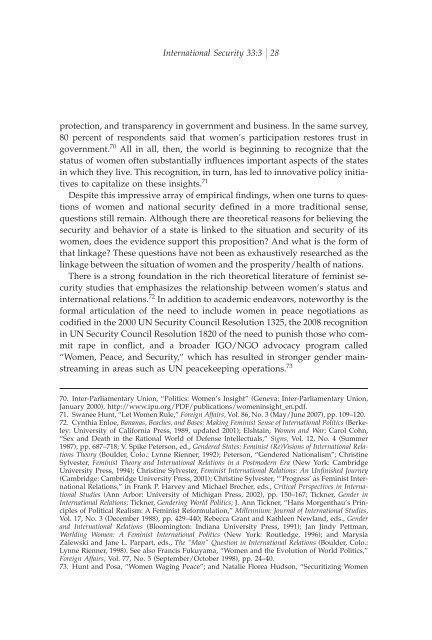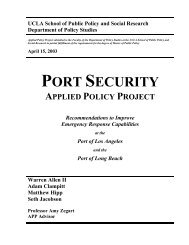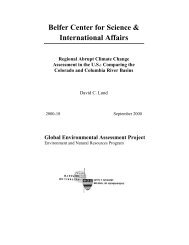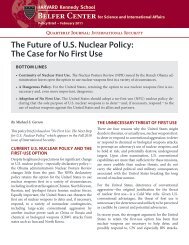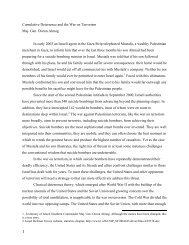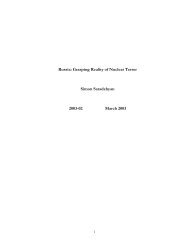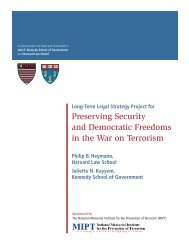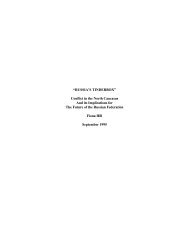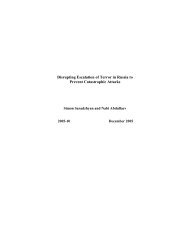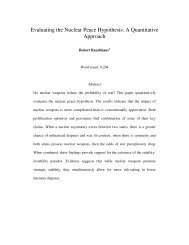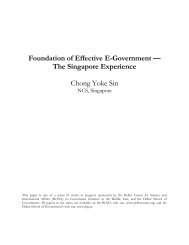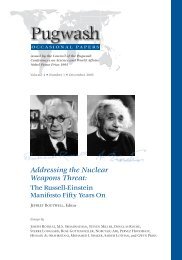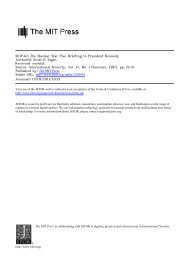The Heart of the Matter Valerie M. Hudson, - MIT Press Journals
The Heart of the Matter Valerie M. Hudson, - MIT Press Journals
The Heart of the Matter Valerie M. Hudson, - MIT Press Journals
Create successful ePaper yourself
Turn your PDF publications into a flip-book with our unique Google optimized e-Paper software.
International Security 33:3 28<br />
protection, and transparency in government and business. In <strong>the</strong> same survey,<br />
80 percent <strong>of</strong> respondents said that women’s participation restores trust in<br />
government. 70 All in all, <strong>the</strong>n, <strong>the</strong> world is beginning to recognize that <strong>the</strong><br />
status <strong>of</strong> women <strong>of</strong>ten substantially inºuences important aspects <strong>of</strong> <strong>the</strong> states<br />
in which <strong>the</strong>y live. This recognition, in turn, has led to innovative policy initiatives<br />
to capitalize on <strong>the</strong>se insights. 71<br />
Despite this impressive array <strong>of</strong> empirical ªndings, when one turns to questions<br />
<strong>of</strong> women and national security deªned in a more traditional sense,<br />
questions still remain. Although <strong>the</strong>re are <strong>the</strong>oretical reasons for believing <strong>the</strong><br />
security and behavior <strong>of</strong> a state is linked to <strong>the</strong> situation and security <strong>of</strong> its<br />
women, does <strong>the</strong> evidence support this proposition? And what is <strong>the</strong> form <strong>of</strong><br />
that linkage? <strong>The</strong>se questions have not been as exhaustively researched as <strong>the</strong><br />
linkage between <strong>the</strong> situation <strong>of</strong> women and <strong>the</strong> prosperity/health <strong>of</strong> nations.<br />
<strong>The</strong>re is a strong foundation in <strong>the</strong> rich <strong>the</strong>oretical literature <strong>of</strong> feminist security<br />
studies that emphasizes <strong>the</strong> relationship between women’s status and<br />
international relations. 72 In addition to academic endeavors, noteworthy is <strong>the</strong><br />
formal articulation <strong>of</strong> <strong>the</strong> need to include women in peace negotiations as<br />
codiªed in <strong>the</strong> 2000 UN Security Council Resolution 1325, <strong>the</strong> 2008 recognition<br />
in UN Security Council Resolution 1820 <strong>of</strong> <strong>the</strong> need to punish those who commit<br />
rape in conºict, and a broader IGO/NGO advocacy program called<br />
“Women, Peace, and Security,” which has resulted in stronger gender mainstreaming<br />
in areas such as UN peacekeeping operations. 73<br />
70. Inter-Parliamentary Union, “Politics: Women’s Insight” (Geneva: Inter-Parliamentary Union,<br />
January 2000), http://www.ipu.org/PDF/publications/womeninsight_en.pdf.<br />
71. Swanee Hunt, “Let Women Rule,” Foreign Affairs, Vol. 86, No. 3 (May/June 2007), pp. 109–120.<br />
72. Cynthia Enloe, Bananas, Beaches, and Bases: Making Feminist Sense <strong>of</strong> International Politics (Berkeley:<br />
University <strong>of</strong> California <strong>Press</strong>, 1989, updated 2001); Elshtain, Women and War; Carol Cohn,<br />
“Sex and Death in <strong>the</strong> Rational World <strong>of</strong> Defense Intellectuals,” Signs, Vol. 12, No. 4 (Summer<br />
1987), pp. 687–718; V. Spike Peterson, ed., Gendered States: Feminist (Re)Visions <strong>of</strong> International Relations<br />
<strong>The</strong>ory (Boulder, Colo.: Lynne Rienner, 1992); Peterson, “Gendered Nationalism”; Christine<br />
Sylvester, Feminist <strong>The</strong>ory and International Relations in a Postmodern Era (New York: Cambridge<br />
University <strong>Press</strong>, 1994); Christine Sylvester, Feminist International Relations: An Unªnished Journey<br />
(Cambridge: Cambridge University <strong>Press</strong>, 2001); Christine Sylvester, “‘Progress’ as Feminist International<br />
Relations,” in Frank P. Harvey and Michael Brecher, eds., Critical Perspectives in International<br />
Studies (Ann Arbor: University <strong>of</strong> Michigan <strong>Press</strong>, 2002), pp. 150–167; Tickner, Gender in<br />
International Relations; Tickner, Gendering World Politics; J. Ann Tickner, “Hans Morgenthau’s Principles<br />
<strong>of</strong> Political Realism: A Feminist Reformulation,” Millennium: Journal <strong>of</strong> International Studies,<br />
Vol. 17, No. 3 (December 1988), pp. 429–440; Rebecca Grant and Kathleen Newland, eds., Gender<br />
and International Relations (Bloomington: Indiana University <strong>Press</strong>, 1991); Jan Jindy Pettman,<br />
Worlding Women: A Feminist International Politics (New York: Routledge, 1996); and Marysia<br />
Zalewski and Jane L. Parpart, eds., <strong>The</strong> “Man” Question in International Relations (Boulder, Colo.:<br />
Lynne Rienner, 1998). See also Francis Fukuyama, “Women and <strong>the</strong> Evolution <strong>of</strong> World Politics,”<br />
Foreign Affairs, Vol. 77, No. 5 (September/October 1998), pp. 24–40.<br />
73. Hunt and Posa, “Women Waging Peace”; and Natalie Florea <strong>Hudson</strong>, “Securitizing Women


